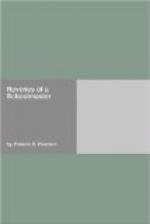So I am grateful to Horace for the expression. Having started right in the midst of things, one can never get off the subject, and that is a great comfort. Sometimes college graduates confess (or perhaps boast) that they have forgotten their Latin. I fear to follow their example lest my neighbor, who often drops in for a friendly chat, might get to wondering whether I have not also forgotten much of the English I am supposed to have acquired in college. He might regard my English as quite as feeble when compared with Shakespeare or Milton as my Latin when compared with Cicero or Virgil. So I take counsel with prudence and keep silent on the subject of Latin.
When I am taking a stroll in the woods, as I delight to do in the autumn-time, laundering my soul with the gorgeous colors, the music of the rustling leaves, the majestic silences, and the sounds that are less and more than sounds, I often wonder, when I take one bypath, what experiences I might have had if I had taken the other. I’ll never know, of course, but I keep on wondering. So it is with this Latin. I wonder how much worse matters could or would have been if I had never studied it at all. As the old man said to the young fellow who consulted him as to getting married: “You’ll be sorry if you do, and sorry if you don’t.” I used to feel a sort of pity for my pupils to think how they would have had no education at all if they had not had me as their teacher; now I am beginning to wonder how much further along they might have been if they had had some other teacher. But probably most of the misfits in life are in the imagination, after all. We all think the huckleberries are more abundant on the other bush.
Hoeing potatoes is a calm, serene, dignified, and philosophical enterprise. But at bottom it is much the same in principle as teaching school. In my potato-patch I am merely trying to create situations that are favorable to growth, and in the school I can do neither more nor better. I cannot cause either boys or potatoes to grow. If I could, I’d certainly have the process patented. I know no more about how potatoes grow than I do about the fourth dimension or the unearned increment. But they grow in spite of my ignorance, and I know that there are certain conditions in which they flourish. So the best I can do is to make conditions favorable. Nor do I bother about the weeds. I just centre my attention and my hoe upon loosening the soil and let the weeds look out for themselves. Hoeing potatoes is a synthetic process, but cutting weeds is analytic, and synthesis is better, both for potatoes and for boys. In good time, if the boy is kept growing, he will have outgrown his stone-bruises, his chapped hands, his freckles, his warts, and his physical and spiritual awkwardness. The weeds will have disappeared.




